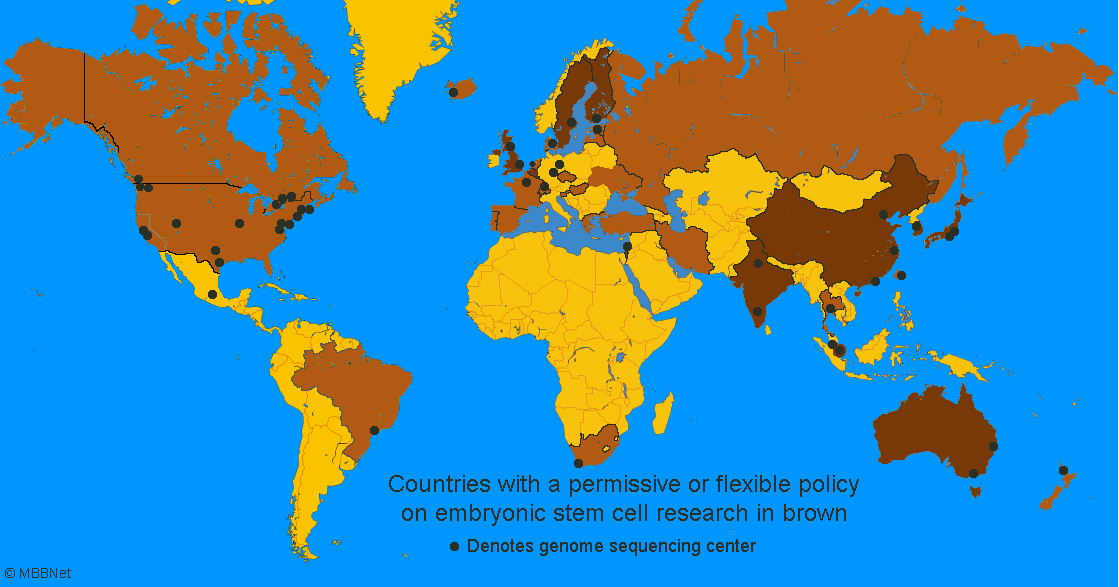STEM CELL ISSUES
Despite the innovations and progress associated with stem cell therapy, there are still inevitable ethical, social and legal issues.
Ethical and Social Issues
Embryonic stem cells and their therapies have sparked a lot of controversy in today's world regarding the definition of and respect for life. In order to extract embryonic stem cells, scientists have to destroy an early embryo, raising questions like:
-
When does life begin?
-
Is an embryo equivalent to a person?
-
Do embryos have rights?
-
Is it justified to destroy an embryo because it has the potential to save many more lives?
FOR: Supporters of embryonic stem cell research argue that the cells' potential to save and improve human lives justifies the destruction of just a single embryo. They maintain that an embryo is too early in the stages of development to be considered a human. In-vitro fertilization creates so many cells that many end up being unused, so the extra can serve as research tools for scientists instead of being wasted. The benefits of embryonic stem cells far outweigh the costs.
AGAINST: Many religious leaders and pro-life activists have equated the destruction of an embryo to murder, asserting that embryos should be considered "human" and therefore deserve the same rights as any person. They argue that life begins at conception, and although the embryo isn't characteristic of a human being yet, it is in the process of developing into a "full human". They advocate for the use of adult and cord blood stem cells to treat diseases and medical issues.
No matter what the arguments for/against embryonic stem cells are, new developments are being made that will allow other types of stem cells to be used. Induced pluripotent stem cells (IPSCs), an alternative to embryonic stem cells, were developed in 2006. Research suggests that IPSCs have great potential in treating many of the same conditions that embryonic stem cells can, since they are both pluripotent stem cells. Hopefully the debate on embryonic stem cells will settle down in the next few years, as new alternatives and solutions arise to the ethical and social issues concerning embryonic stem cells.


Your Opinion:
Legal Issues
Countries around the world have responded to stem cell research differently. Most restrictions are on embryonic stem cells, since they are the most controversial. In many places, stem cell research is regulated to a extent - different techniques and methods may be allowed or banned in certain countries. Most of Africa and South America restrict embryonic stem cell research, but large parts of Asia and Europe allow it. For the most part, it is supported in Canada and the US, but individual states may have different laws governing the legality of embryonic stem cells.

Around the World
In the United States


States in the US have passed different laws regarding the regulation of stem cell research. The country is divided on the topic - some states fully support it, others have placed restrictions on it, and a few have completely prohibited it. Many states have not proposed stem cell legislation yet, but as stem cell research becomes more important in the scientific and medical industry, states will start to take a stand.
The federal government has passed many laws regarding stem cell research and funding. Currently, only private funding of embryonic stem cells and public and private funding on adult and cord blood stem cells are unrestricted.
1995 - President Clinton signs the Dickey Amendment, restricting funding to the Department of Health and Human Services and the National Institutes of Health for research that results in the destruction of a human embryo.
2001 - President Bush allows federal funding for only 21 pre-existing embryonic stem cell lines. Future embryonic stem cell lines will not be funded.
2005-2007 - President Bush vetoes several Stem Cell Research Enhancement Acts, bills that would allow federal funding for embryonic stem cell research on leftover embryos from in vitro fertilization.
2009 - President Obama lifts restrictions on stem cell research with the Omnibus Appropriations Act of 2009, allowing federal funding of embryonic stem cell research. This helps expand and stimulate stem cell research.